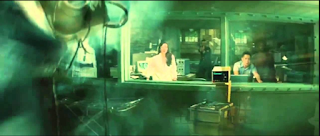General Research into Title Sequences.
Incredible Hulk (2008)
 The opening credits act as a prologue to the film. It starts with a red danger button, which straight away hints to the audience that the genre in an action, with a voice over explaining what is happening while the protagonist is strapped to a chair.The use of a shot-reverse-shot between the protagonist and a female character sets up a romantic sub plot, as it hints the two are close, which is then supported by further scenes of the two through a flashback. The props, such as newspaper and photographs give the audience more context to what is going on. There is an intense parallel non-digetic soundtrack during the opening credits which gives the film a serious atmosphere. During the live action scenes the camera angle switches to a PoV shot, so the audience not only see what the protagonist does but also hides his identity as the Hulk
creating narrative enigma. Throughout the
opening credits there is a green tone to it, this represents the Hulk as
the colour is a theme that runs through the whole film.
The opening credits act as a prologue to the film. It starts with a red danger button, which straight away hints to the audience that the genre in an action, with a voice over explaining what is happening while the protagonist is strapped to a chair.The use of a shot-reverse-shot between the protagonist and a female character sets up a romantic sub plot, as it hints the two are close, which is then supported by further scenes of the two through a flashback. The props, such as newspaper and photographs give the audience more context to what is going on. There is an intense parallel non-digetic soundtrack during the opening credits which gives the film a serious atmosphere. During the live action scenes the camera angle switches to a PoV shot, so the audience not only see what the protagonist does but also hides his identity as the Hulk
creating narrative enigma. Throughout the
opening credits there is a green tone to it, this represents the Hulk as
the colour is a theme that runs through the whole film. 
Love Actually (2003)
The opening credits for Love Actually
clearly states the genre of the film, romance, through achieve footage
that capture peoples reactions when seeing their loved ones at the airport. The
narrative voice over acts as Gods voice and and hints the genre through
repeating the word "love." This title sequence is unconventional as
it doesn't establish the plot and leaves the audience in the dark.
Se7en (1995)
 The opening credits for David Fincher's
Se7en changed the way opening credits were made due to Kyle Cooper 'breaking
the mould.' The shots are all filmed close up, creating narrative enigma from start as the audience does not know who is creating the journal or why they
are doing it. The clips are not in chronological order and are montaged
together, showing how frantic the character's mind is. Also by seeing the
character create the journal, the audience learns that he is a sinister
character hinting he is the antagonist. The soundtrack consists of a
scratching noise that makes the viewer feel uncomfortable, which adds to the
atmosphere that helps show the genre, thriller.
The opening credits for David Fincher's
Se7en changed the way opening credits were made due to Kyle Cooper 'breaking
the mould.' The shots are all filmed close up, creating narrative enigma from start as the audience does not know who is creating the journal or why they
are doing it. The clips are not in chronological order and are montaged
together, showing how frantic the character's mind is. Also by seeing the
character create the journal, the audience learns that he is a sinister
character hinting he is the antagonist. The soundtrack consists of a
scratching noise that makes the viewer feel uncomfortable, which adds to the
atmosphere that helps show the genre, thriller.
To Kill a Mockingbird (1995)
The title sequence for to Kill a Mockingbird
was filmed in black and white, with only the title ofitself being added in
before post-production, it is shown through the child featured in the sequence
writing it. It crabs along a box and shows various props but focuses on the
whistle, this could signify the props importance. The sound also adapts
throughout the sequence as the child’s humming changes to an orchestral
piece.
Dr Strangelove (1964)
The title sequence for Dr Strangelove is
hand written typography added after the production of the film, which covers
the majority of the screen, putting an emphasis on what the creators want the
audience to focus on. There is also transitions between shots through
two shots blending into one which is a dissolve.



No comments:
Post a Comment